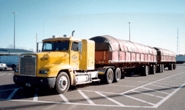Analysis

February 7, 2020
ATA Pleads Urgency for Infrastructure Spending
Written by Sandy Williams
The American Trucking Association appealed for the implementation of a fuel tax to support highway and border infrastructure during recent testimony in Washington by President and CEO Chris Spear.
“The fuel tax is the most immediate, cost-efficient and conservative mechanism currently available for funding surface transportation projects and programs. Collection costs are less than 1 percent of revenue,” said Spear in testimony on Thursday before the House Ways and Means Subcommittee on Trade.
“There is a perception that the fuel tax is no longer a viable revenue source due to the availability of electric vehicles and improvements in vehicle fuel efficiency. This notion is belied by the facts. According to the Congressional Budget Office’s latest estimates, revenue from fuel taxes will drop 5 percent over the next decade, or about $2 billion. A modest increase in the fuel tax, or a new fee on alternative fuel vehicles, can easily recover these lost revenues.”
The Build America Fund proposed by ATA would be supported with a new 20 cent per gallon fee on transportation fuels that would be phased in over four years. ATA estimates the fuel tax would generate nearly $340 billion over the first 10 years and cost the average passenger vehicle driver about $100 per year. In addition, ATA supports a fee on hybrid and electric vehicles that use reduced or no traditional fuels.
The need for improving the nation’s highways, bridges and ports is critical to safety and the economy. Freight tonnage is projected to grow by 23 percent during the next decade and the trucking industry will be tasked with hauling 2.4 billion more tons of freight than it moved in 2019, said Spear. Part of that tonnage will come from increased commerce under the USMCA. The new trade agreement is expected to boost trade with Canada and Mexico by 5 percent, or $68.1 billion annually.
A major portion of U.S. commerce is conducted through the nation’s ports, which will need government support to correct inefficiencies. A study by the Commerce Department found that delays at ports are costing the U.S. economy as much as $5.8 billion annually. Volume growth at U.S. ports has caused an increase in wait times for trucks to have cargo loaded.
“The underlying tenet of the relationship between ports and the trucking industry is—the faster the cargo and containers can be arranged for pickup by the motor carrier at the ports, the more efficient the ports and the trucking industry will be,” said Spear. “If all of the moving parts are not working in unison, including labor, the operation of equipment at the ports, and the arrangement of the container for the truck to pick up, efficiencies will decrease.”
Congestion on the nation’s intermodal connecting roads cause more than a million hours of delay annually for the construction industry. Poorly maintained roads add further delays and safety concerns for drivers and also cause damage to vehicles and the freight they carry.
“A first-world economy cannot survive a third-world infrastructure system. The federal government has a constitutional responsibility to ensure that the resources are available to address this self-imposed and completely solvable situation,” said Spear. “The Commerce Clause does not represent an antiquated 18th century ideal; it is what binds us a nation. E Pluribus Unum – out of many, one.”






